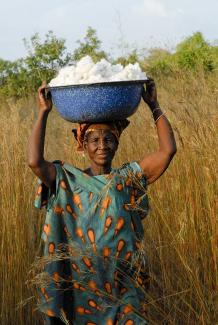Promoting change
Go shopping with open eyes

The educational project „FairSchnitt“ is run by the feminist organisation Femnet. It wants to ensure that sustainability aspects are tackled in the curricula of fashion- and clothes-related studies. Relevant topics include workers’ rights as well as social and environmental standards in the entire supply chain. The project is run at German universities. It offers educational material, trains multipliers and organises conferences and exhibitions.
http://www.fairschnitt.org/ (only in German)
The Christliche Initative Romero, a faith-based organisation, is promoting the sale of fairtrade graduation shirts within its clean-clothes campaign. The aim is to raise awareness among kids who graduate from school. A leaflet points out under which conditions garments are produced, promoting the purchase of fair trade clothes. A second leaflet addresses teachers and provides information on the background of the clean-clothes campaign. It also indicates options for action and proposes ideas for teaching students of all ages.
http://www.saubere-kleidung.de/index.php/oeffentliche-beschaffung/schulkleidung/389-zwei-neue-faltblaetter-zum-thema-schul-t-shirts (only in German)
Arbeiterwohlfahrt International (AWO), a civil-society organisation, hosts workshops for teenagers and adults in the context of its programme called: “Cheap clothes – at what cost?” The focus is on cheap products that are linked to social and economic grievances. Participants are encouraged to take a critical look at their own lifestyle and consumer habits. They discuss criteria for responsible shopping and are informed about different labels.
The Südwind Institute, a non-governmental think tank, is working on an analysis of the preliminary stages of the textiles production chain in India – considering, for instance, the first processing stage of cotton and ginning. Südwind is doing research on different work environments, and insists that work conditions at the beginning of the value chain are just as problematic as those in garment factories. The institute plans to publish a study and two fact sheets dealing with the matter by the end of this year. Engagement Global is contributing funds in support of a conference and the production of educational material.
http://www.suedwind-institut.de/newsletter/newsletter-3-14/ (only in German)
Katja Dombrowski








